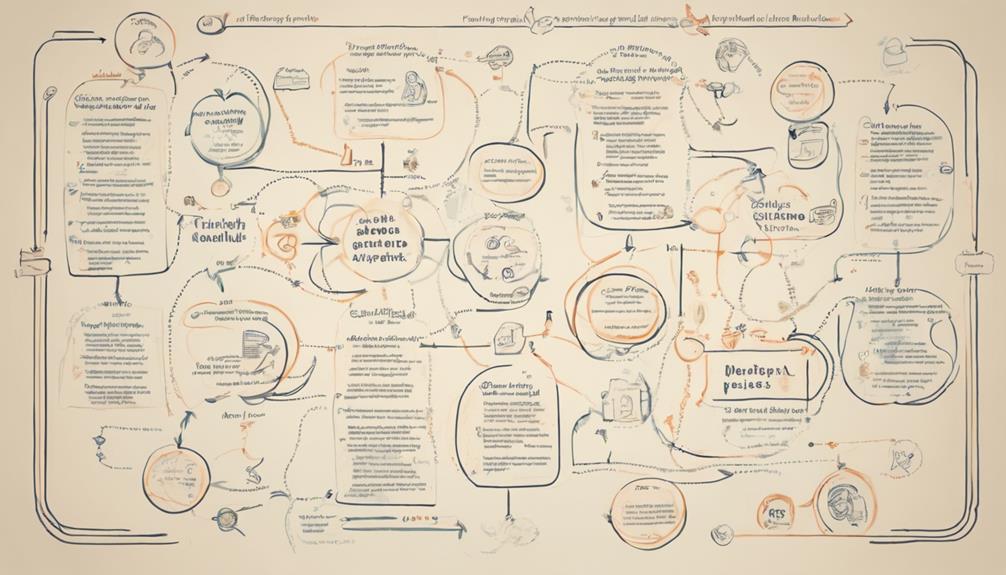Have you ever wondered how often a newborn should poop when exclusively on breast milk? The frequency of your baby's bowel movements can be quite a topic of concern for new parents. Understanding what is considered normal and when to seek advice can alleviate worries and make certain your baby's health.
Let's explore the factors that influence a newborn's poop patterns and what to watch out for in their diaper changes.
Key Takeaways
- Newborns typically poop after each nursing session in the early weeks.
- Frequent pooping indicates sufficient milk intake and hydration.
- Infrequent pooping may signal issues with milk intake or digestion.
- Monitoring poop frequency is crucial for assessing the newborn's well-being.
Newborn Poop Frequency on Breast Milk
In the early weeks after birth, breastfed newborns typically have bowel movements after each nursing session, a reassuring sign of their health and nutrition intake. It's common for infants on breast milk to have up to six or more bowel movements per day initially. This frequent poop frequency is a positive indicator that your baby is receiving enough milk and is properly hydrated.
As newborns grow, the number of bowel movements can vary. Some breastfed babies may start pooping less frequently, even to just once a day or once a week, which is still considered important as long as the consistency is appropriate. Monitoring your newborn's poop output is important to make sure they're adequately nourished.
Signs of Healthy Bowel Movements
As we observe our newborns, the color and consistency of their bowel movements serve as key indicators of their digestive health and milk intake. When it comes to breastfed babies, paying attention to their poop is important for ensuring they're thriving. Here are some signs of healthy bowel movements to watch for:
- Frequent Pooping: A healthy breastfed newborn typically poops multiple times a day, showcasing the sufficiency of their milk intake and the efficiency of their digestive system.
- Mustard-Yellow Color: Breastfed baby poop is usually mustard-yellow in color, a reassuring sign that they're digesting and absorbing breast milk effectively.
- Consistency and Regularity: Consistent and regular bowel movements in breastfed newborns indicate a well-functioning digestive system and the best nutritional status.
Concerns for Infrequent Pooping
Should your breastfed newborn show signs of infrequent pooping, it's essential to monitor their bowel movements closely for any potential concerns. Breastfed newborns typically have several bowel movements a day, and a lack of regular pooping could signal an issue with milk intake or digestion. If your baby isn't pooping regularly or seems uncomfortable, consulting the pediatrician is advisable to rule out any underlying problems. Monitoring the frequency of bowel movements is critical for evaluating your baby's well-being and guaranteeing proper nutrition.
While it's normal for breastfed newborns to have varying patterns of bowel movements, prolonged periods of infrequent pooping can be worrying. This could indicate that your baby isn't getting enough milk or might be having trouble digesting it effectively. By staying vigilant and seeking medical advice when needed, you can address any concerns early on and ensure your baby's health and comfort. Remember, your pediatrician is there to support you and answer any questions you may have about your baby's bowel movements.
Dealing With Excessive Pooping
If your breastfed newborn is pooping excessively, it could be a positive sign of efficient milk digestion and efficient nutrient absorption. This is a good indication that your baby's digestive system is working well and they're getting the necessary nutrients from your breast milk.
Here are some tips for dealing with excessive pooping:
- Monitor Hydration: Guarantee your baby stays hydrated by offering breast milk frequently. Excessive pooping can lead to dehydration, so it's important to keep an eye on your baby's wet diapers.
- Check for Allergies: In some cases, excessive pooping could be a sign of a food intolerance or allergy. If you notice any other symptoms like rashes or fussiness, consult with a healthcare provider to rule out any potential allergies.
- Maintain Skin Health: With frequent pooping, your baby's skin may become irritated. Keep the diaper area clean and dry to prevent diaper rash and discomfort.
Consulting a Healthcare Provider
When concerned about a newborn's poop frequency on breast milk, seeking guidance from a healthcare provider is vital for ensuring the baby's health and well-being. Healthcare providers can offer valuable insights into the normal poop patterns for breastfed newborns, aiding in understanding what to expect and when to seek further assistance.
Consulting a healthcare provider guarantees that the baby's health is monitored effectively, and any concerns about the newborn's poop habits can be addressed promptly. Professional advice from a healthcare provider is essential for tracking the newborn's poop frequency accurately, guiding parents on when to be vigilant or when everything is within normal parameters.
Regular communication with a healthcare provider establishes a supportive network for parents, providing reassurance and guidance in managing the baby's health. By partnering with a healthcare provider, parents can navigate the intricacies of their newborn's development with confidence and peace of mind.
Frequently Asked Questions
How Many Times Should a Newborn Poop a Day on Breast Milk?
Assessing the concern about a newborn's poop frequency on breast milk. It's common for breastfed babies to poop several times a day. However, variations occur, and some may poop less often. Monitoring this can aid in understanding their health.
How Often Should a Newborn Poop Chart?
We believe newborn poop frequency on breast milk is diverse, ranging from several times daily to once a week. It's crucial to monitor the number and consistency to guarantee the baby's health. Trust your instincts and consult a healthcare provider for guidance.
How Long Can Breast Fed Babies Go Without Pooping?
I acknowledge the concern about how long breastfed babies can go without pooping. It's normal for breastfed infants to have varying poop patterns. As long as baby is active, feeding well, and gaining weight, occasional days without pooping are usually okay.
How Many Poos Should a Breastfed Newborn Have?
It's comforting to acknowledge the concern new parents may have about how often their breastfed newborn should poop. It's reassuring to know that infants can have a wide range of bowel movements daily, as many as 12 times, reflecting the healthy digestion of breast milk.
Conclusion
To sum up, monitoring a newborn's poop frequency on breast milk is crucial for their overall health and well-being. Remember, 'prevention is better than cure.'
By observing signs of healthy bowel movements, addressing concerns for infrequent pooping, and seeking guidance from a healthcare provider when needed, parents can guarantee their baby's digestive system is functioning properly.
Trust your instincts and don't hesitate to seek help if you have any concerns about your baby's poop patterns.








